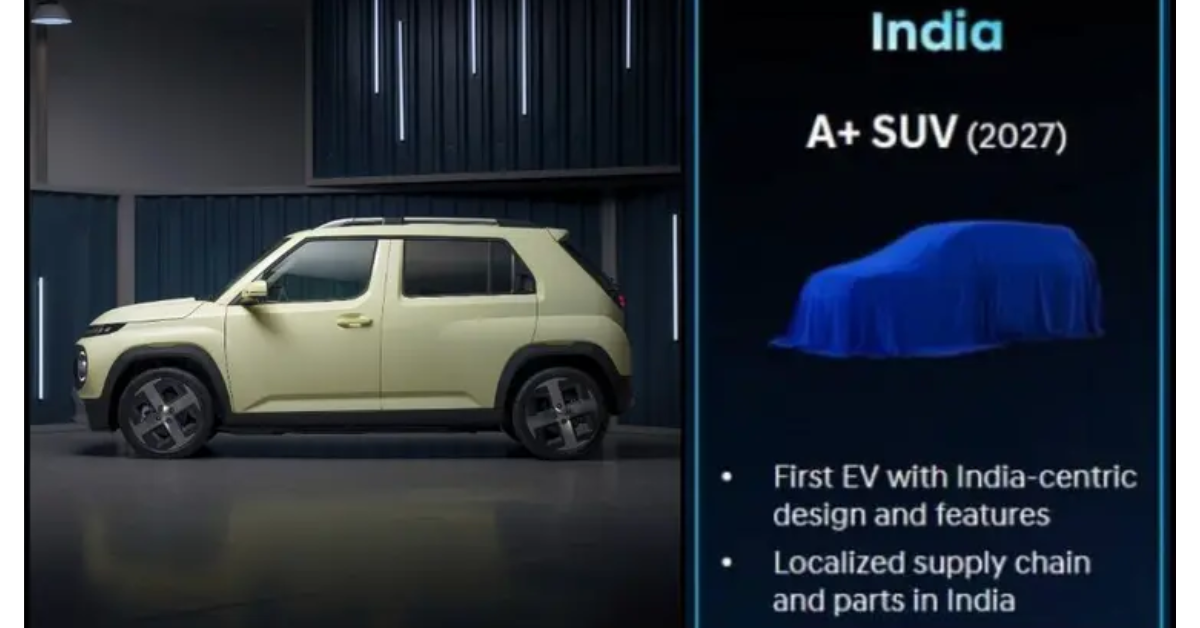The electric vehicle revolution is picking up pace in India, and Hyundai has now officially confirmed that it will bring an entry-level electric SUV to the Indian market by 2027. This strategic move reflects Hyundai’s commitment to sustainable mobility and its desire to tap into the rapidly growing demand for affordable, zero-emission SUVs in India.
The upcoming EV is expected to combine practicality, modern design, and Hyundai’s proven reliability, aiming to attract urban families, young professionals, and environmentally-conscious buyers.
Hyundai’s Electric Ambitions in India
Hyundai has been a pioneer in India’s electric vehicle segment, starting with the Kona Electric, which remains one of the country’s most popular electric SUVs. However, the Kona is positioned in the premium segment, making it out of reach for many buyers.
With the entry-level EV SUV, Hyundai aims to:
- Offer a more affordable alternative to the Kona Electric.
- Cater to the growing urban EV market, especially in Tier 1 and Tier 2 cities.
- Expand its EV portfolio in India, complementing upcoming models like the Ioniq 5 and future electric sedans.
This move aligns with India’s EV policy goals, encouraging automakers to provide sustainable mobility options in a cost-effective manner.
Expected Design and Features
Although Hyundai has not released official images yet, industry experts predict the entry-level EV SUV will feature:
- Compact SUV Proportions: Similar in size to the Hyundai Creta, offering practicality and ease of maneuvering in urban environments.
- Modern Electric Styling: Closed-off grille, sleek LED headlamps, and aerodynamic body panels to maximize efficiency.
- Futuristic Interiors: Minimalist dashboard, digital instrument cluster, large touchscreen infotainment system, and sustainable interior materials.
- Smart Technology: Advanced driver-assistance systems (ADAS), connected car features, and multiple charging options.
The SUV is expected to focus on user-friendly features and a stylish, contemporary design, appealing to first-time EV buyers.
Expected Battery, Range, and Performance
One of the most critical factors for Indian EV buyers is range. Hyundai is expected to equip the entry-level SUV with:
- Battery Pack: Around 40–50 kWh lithium-ion battery.
- Driving Range: Likely 300–350 km per charge under real-world driving conditions.
- Charging Capability: Support for fast charging, potentially 10–80% in under an hour, along with home AC charging.
- Motor Output: Estimated 120–150 bhp, ensuring peppy city performance while keeping energy efficiency high.
These specifications would make the SUV practical for daily commuting and occasional weekend trips, addressing range anxiety concerns among Indian buyers.
Competitors in the Indian Market
By 2027, the entry-level EV SUV segment in India is expected to be highly competitive, with several domestic and international brands planning launches. Potential competitors include:
- Tata Nexon EV – Currently India’s best-selling electric SUV, known for its affordability and reliability.
- MG Comet EV (expected) – MG’s upcoming compact EV SUV targeted at younger buyers.
- Mahindra XUV.e or Scorpio EV – Mahindra is expected to expand its EV portfolio in India by 2027.
- Other international EVs – Volkswagen, Kia, and Nissan could introduce smaller EV SUVs.
Hyundai’s brand reliability, aftersales network, and early mover advantage in EVs could give it a competitive edge in this segment.
Pricing Expectations
While Hyundai has not revealed pricing, the entry-level positioning suggests a price range of ₹15–20 lakh (ex-showroom). This would put the SUV in a sweet spot for buyers who want:
- An SUV body style for space and practicality.
- Zero-emission driving without a premium price tag.
- Modern features and connected technology.
If Hyundai manages to maintain affordability while offering decent range and performance, the SUV could become India’s most sought-after electric entry-level SUV.
Why This SUV Matters for India
India’s EV market is at a tipping point. With government incentives under the Faster Adoption and Manufacturing of Hybrid and Electric Vehicles (FAME II) scheme, combined with increasing environmental awareness, entry-level electric SUVs are expected to become mainstream.
Hyundai’s SUV is likely to impact the market in several ways:
- Encourage EV Adoption – Affordable options make EVs accessible to middle-class families.
- Reduce Carbon Footprint – More electric SUVs on Indian roads will contribute to cleaner air in cities.
- Boost Competition – Pushes other automakers to improve specs and reduce prices.
- Create EV Ecosystem Growth – Increased sales drive infrastructure growth like charging stations.
In essence, Hyundai’s 2027 SUV could reshape the perception of EVs in India from niche luxury to everyday practicality.
Hyundai’s EV Strategy: Beyond 2027
The entry-level SUV is just one step in Hyundai’s broader EV vision for India and globally. The company plans to:
- Expand its EV portfolio across hatchbacks, sedans, and SUVs.
- Invest in charging infrastructure partnerships to make EV ownership easier.
- Promote connected and autonomous-ready technologies in future models.
Hyundai’s proactive approach ensures it stays ahead of the curve as India transitions toward sustainable mobility.
Conclusion
Hyundai’s announcement of an entry-level electric SUV for India in 2027 marks a significant milestone in the country’s EV journey. By combining affordable pricing, practical range, modern design, and advanced technology, Hyundai aims to make electric mobility accessible to a larger audience.
For Indian buyers, this SUV represents a perfect balance between sustainability, style, and functionality. With increasing competition in the EV segment, the launch will be one of the most anticipated events in the coming years.
As India moves toward a greener automotive future, Hyundai’s entry-level EV SUV is set to become a key player, encouraging more families to embrace zero-emission vehicles without compromising on practicality or luxury.
